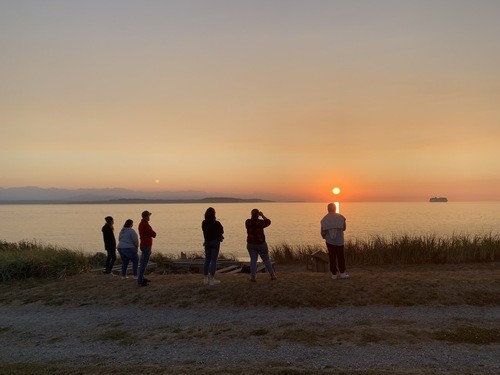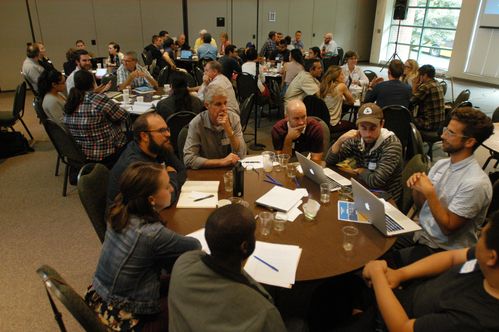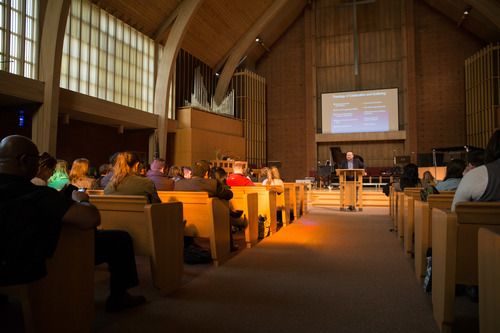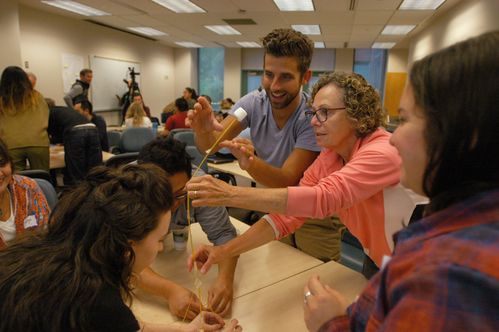5 Things You Can Do Right Now

1. Elevate young adults to areas of leadership in the congregation (where budget-making decisions occur).
The churches that seemed most equipped to take full advantage of the money and resources provided by the grant were the ones that had already identified and supported young adults in church leadership. Because these young adults had already been elevated to positions of leadership where budgetary decisions were being made, a number of advantages were in place. For example:
A. There was an existing relationship between their leadership and the congregation
B. The church had already made explicit and lived out the value of having young adult leadership
Read Blog post "Young Adults on Council!?"
A. There was an existing relationship between their leadership and the congregation
B. The church had already made explicit and lived out the value of having young adult leadership
Read Blog post "Young Adults on Council!?"
2. Collect and listen to stories about your church from people of various generations/populations.
The Danger of the Single Story became abundantly clear as we designed our application, which would most likely be filled out by the church pastor. We needed to solicit several stories (we asked for 5 minimum, specifying for at least 2 young adults, a pastor, a church council person, and an older congregant) so that we could get a clearer picture of different facets of the church. This task can:
A. Create empathy between congregants who don't usually connect or who haven't done deep connection work
B. Examine both old history that affects the psyche of the church and explore how wide the effect of more recent history might be
C. Identify marginalized groups or feelings of marginalization
Read more about the Story Chasing concept.
A. Create empathy between congregants who don't usually connect or who haven't done deep connection work
B. Examine both old history that affects the psyche of the church and explore how wide the effect of more recent history might be
C. Identify marginalized groups or feelings of marginalization
Read more about the Story Chasing concept.


3. Budget for and implement a program for intergenerational relationship building. Include reciprocal mentorship and vulnerability.
Often when churches make an effort to integrate intergenerationally, the majority of older congregants are eager to mentor young adults, sharing their experience and wisdom. While sometimes that is well received, young adults usually seek a more reciprocal relationship. This requires a commitment to humility on the part of older adults...and close attention ought to be paid to the power dynamics of older adults hosting younger adults.
Blog Post: How some churches are creating safe spaces for young adults to form intergenerational relationships
Blog Post: How some churches are creating safe spaces for young adults to form intergenerational relationships
4. Create and support a space for young adults to grow in faith together.
While older adults may strive to have empathetic responses toward young adults, sometimes there is no alternative to young adults having a space of their own. Gathering with peers means these spaces are naturally sensitive to the challenges of young adulthood. Communicate that young adult faith growth is important by creating spaces for them to grow together. To maximize the building of trust, churches can fully fund and support these spaces while abdicating control of them, enabling young adult agency. The key to doing this successfully is maintaining a constant dialogue: be close enough to support but far enough to give freedom; give autonomy to do their own thing but be invitational about moving toward intergenerational relationships; establish regular and appropriate check-in times to ensure communication lines are open.
Check out Pivot NW's Discussion Guides to encourage deep conversation, relationship-building, and faith growth for young adults.
Check out Pivot NW's Discussion Guides to encourage deep conversation, relationship-building, and faith growth for young adults.


5. Build a young adult initiative team at your church.
A young adult initiative team is an intergenerational group that casts vision and takes action toward better inclusion of young adults within your church. This has been one of the prime activities of the Pivot NW innovation efforts. Building an intergenerational team that enjoys the full support of the greater church can be synergistic and revitalizing. A team is important because motivations and building blocks will leave with an individual. Because the team will involve young adults, there will likely be turnover due to the transiency and concentrated change associated with that life stage. Using tools like Ideation labs, teams can form one, or a series, of actionable steps to energize a young adult group, which will often lead to a more energized and encouraged congregation.
Our 2020-2021 program year is focused on Succession and Sustainability of young adult groups. Check back for more information on how Pivot NW and our partner churches have tackled these important questions.
Our 2020-2021 program year is focused on Succession and Sustainability of young adult groups. Check back for more information on how Pivot NW and our partner churches have tackled these important questions.
